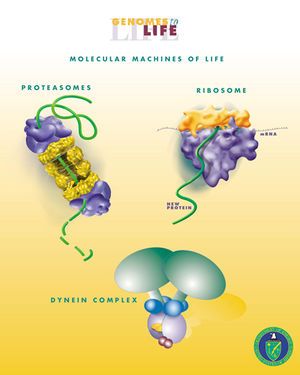
Back Biologiese ingenieurswese Afrikaans هندسة حيوية Arabic Biomühəndislik Azerbaijani জৈব প্রকৌশল Bengali/Bangla Enginyeria biològica Catalan Bioengineering German Ingeniería biológica Spanish Bioingeniaritza Basque مهندسی زیستی Persian Génie biologique French
This article may be confusing or unclear to readers. (November 2017) |

Biological engineering or bioengineering is the application of principles of biology and the tools of engineering to create usable, tangible, economically viable products.[1] Biological engineering employs knowledge and expertise from a number of pure and applied sciences,[2] such as mass and heat transfer, kinetics, biocatalysts, biomechanics, bioinformatics, separation and purification processes, bioreactor design, surface science, fluid mechanics, thermodynamics, and polymer science. It is used in the design of medical devices, diagnostic equipment, biocompatible materials, renewable energy, ecological engineering, agricultural engineering, process engineering and catalysis, and other areas that improve the living standards of societies.
Examples of bioengineering research include bacteria engineered to produce chemicals, new medical imaging technology, portable and rapid disease diagnostic devices, prosthetics, biopharmaceuticals, and tissue-engineered organs.[3][4] Bioengineering overlaps substantially with biotechnology and the biomedical sciences in a way analogous to how various other forms of engineering and technology relate to various other sciences (such as aerospace engineering and other space technology to kinetics and astrophysics).[citation needed]
In general, biological engineers attempt to either mimic biological systems to create products, or to modify and control biological systems. Working with doctors, clinicians, and researchers, bioengineers use traditional engineering principles and techniques to address biological processes, including ways to replace, augment, sustain, or predict chemical and mechanical processes.[5][6]
- ^ Abramovitz, Melissa (2015). Biological engineering. ABDO Publishing Company. p. 10. ISBN 978-1-62968-526-7.
- ^ Herold, Keith; Bentley, William E.; Vossoughi, Jafar (2010). The Basics of Bioengineering Education. 26th Southern Biomedical Engineering Conference. College Park, Maryland: Springer. p. 65. ISBN 9783642149979.
- ^ "What is Bioengineering?". bioeng.berkeley.edu. Retrieved 2018-07-21.
- ^ "MSB: About the Munich School of BioEngineering". www.bioengineering.tum.de. Archived from the original on 2020-02-03. Retrieved 2020-02-03.
- ^ Pasotti, Lorenzo; Zucca, Susanna (2014-08-03). "Advances and Computational Tools towards Predictable Design in Biological Engineering". Computational and Mathematical Methods in Medicine. 2014: 369681. doi:10.1155/2014/369681. PMC 4137594. PMID 25161694.
- ^ Sheffield, University of. "What is bioengineering? - Bioengineering - The University of Sheffield". www.sheffield.ac.uk. Retrieved 2018-07-21.
© MMXXIII Rich X Search. We shall prevail. All rights reserved. Rich X Search